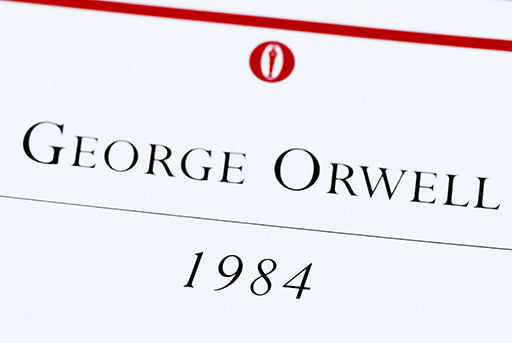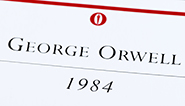1 Orwell’s route to Nineteen Eighty-Four
Nineteen Eighty-Four centres around totalitarianism. Despite this, George Orwell did not have any first-hand knowledge of living in a totalitarian state. He paid just one visit to Germany (in 1945, at the end of the Second World War) and he never visited the Soviet Union. Like others, Orwell had watched from afar as Germany descended from democracy to totalitarianism after Hitler came to power in 1933. Orwell was also aware of reports of Stalin’s purges and the ‘show trials’ of the 1930s (although the full horror of the Stalin era was not revealed until years later), but Orwell’s defining first-hand political experiences were in Spain. There, in July 1936, civil war had broken out following an attempted right-wing military coup against the recently (democratically) elected left-leaning Republican coalition ‘Popular Front’ government.
The Spanish Civil War was to become a highly symbolic cause celebre for idealistic left-wing sympathisers from outside Spain. Orwell travelled to Spain as a journalist at the end of 1936. On arrival, however, he enlisted in an Independent Labour Party Republican unit and was sent to fight on the relatively quiet Aragon Front. He fought in Spain for six months before being badly wounded by a sniper’s bullet. On his return to England in 1937, Orwell set down his partial, impressionistic accounts of what he had seen in Spain – including his disillusionment after witnessing the in-fighting and often brutal factionalism within the pro- and anti- Stalinist communist left in Barcelona.
Orwell’s experiences in Spain during the Spanish Civil War, which is now regarded as a curtain raiser for the Second World War, also convinced him that ideology – of both the far right and the far left – taken to extremes may lead to evil. It was in Spain that Orwell began to think seriously about what were to become the key underlying themes of Nineteen Eighty-Four: the importance of objective ‘truth’, the role of propaganda, what it would be like to live under an authoritarian regime, and why democracy should never be taken for granted.
Many critics have argued that, in terms of plot, Nineteen Eighty-Four is not entirely original. For example, it draws comparisons with an earlier political novel, Yevgeny Zamyatin’s We, (written in the early 1920s) which, like Nineteen Eighty-Four, was banned in the Soviet Union until 1988. Zamyatin – who had initially supported the 1917 Russian Revolution – portrays a world far into the future, ruled by an all-seeing and all-knowing ‘Benefactor’. Zamyatin’s novel’s influence on Nineteen Eighty-Four, as well as Aldous Huxley’s Brave New World, is clear.

Neither was Orwell especially original in his depiction of technology – both HG Wells and EM Forster (to name but two) had already depicted future societies in which people’s lives are ruled by machines and other technologies. Other critics have argued that as a work of literature some of Orwell’s characterisation is thin. But does this matter? Most people would say ‘no’ because of the sheer power of the novel: Orwell’s opening sentence ‘It was a bright cold day in April, and the clocks were striking thirteen’ (Orwell, 1949) remains one of the most famous in modern English literature. Likewise, the adjective ‘Orwellian’ (first used by the novelist Mary McCarthy in 1950) has now passed into the English language. Few people who have read Nineteen Eighty-Four ever forget it.
Before going on to study Nineteen Eighty-Four in more depth, you will first explore more about Orwell himself – and the political experiences which informed so much of his writing.
